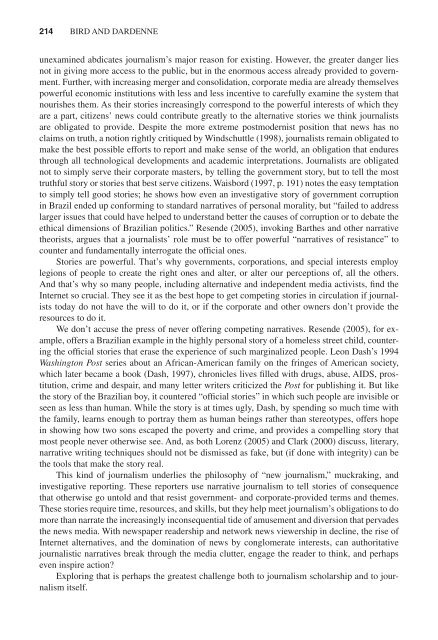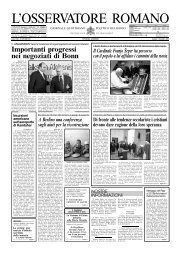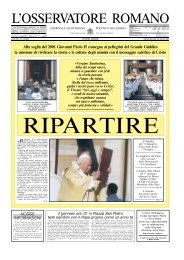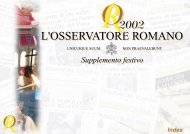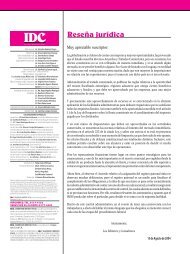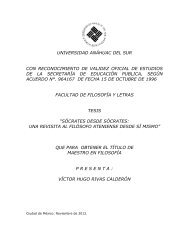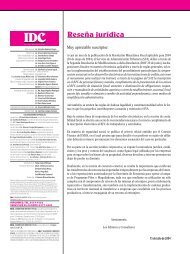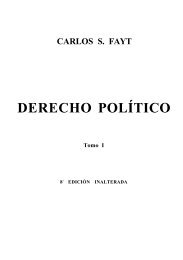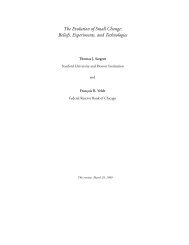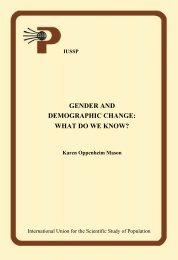- Page 2 and 3:
THE HANDBOOK OF JOURNALISM STUDIES
- Page 4 and 5:
THE HANDBOOK OF JOURNALISM STUDIES
- Page 6 and 7:
Contents Series Editor’s Foreword
- Page 8:
V. JOURNALISM STUDIES IN A GLOBAL C
- Page 11 and 12:
THE ICA HANDBOOK SERIES The ICA Han
- Page 13 and 14:
xii PREFACE state of scholarship an
- Page 15 and 16:
xiv CONTRIBUTORS (University of Ten
- Page 17 and 18:
xvi CONTRIBUTORS Maxwell McCombs ho
- Page 19 and 20:
xviii CONTRIBUTORS Linda Steiner is
- Page 21 and 22:
xx CONTRIBUTORS and the Law (Vision
- Page 24 and 25:
1 Introduction: On Why and How We S
- Page 26 and 27:
1. INTRODUCTION 5 departures betwee
- Page 28 and 29:
JOURNALISM STUDIES TODAY 1. INTRODU
- Page 30 and 31:
1. INTRODUCTION 9 ism rub up agains
- Page 32 and 33:
1. INTRODUCTION 11 is the result of
- Page 34 and 35:
1. INTRODUCTION 13 which are remove
- Page 36 and 37:
1. INTRODUCTION 15 Berkowitz, D. (E
- Page 38 and 39:
2 Journalism History Kevin G. Barnh
- Page 40 and 41:
2. JOURNALISM HISTORY 19 gained imp
- Page 42 and 43:
PROFESSIONALIZATION 2. JOURNALISM H
- Page 44 and 45:
2. JOURNALISM HISTORY 23 well as it
- Page 46 and 47:
2. JOURNALISM HISTORY 25 amount to
- Page 48 and 49:
2. JOURNALISM HISTORY 27 Folkerts,
- Page 50 and 51:
3 Journalism and the Academy Barbie
- Page 52 and 53:
3. JOURNALISM AND THE ACADEMY 31 th
- Page 54 and 55:
3. JOURNALISM AND THE ACADEMY 33 re
- Page 56 and 57:
3. JOURNALISM AND THE ACADEMY 35 ru
- Page 58 and 59:
3. JOURNALISM AND THE ACADEMY 37 in
- Page 60 and 61:
3. JOURNALISM AND THE ACADEMY 39 of
- Page 62 and 63:
3. JOURNALISM AND THE ACADEMY 41 Wa
- Page 64 and 65:
4. JOURNALISM EDUCATION 43 If we ta
- Page 66 and 67:
4. JOURNALISM EDUCATION 45 institut
- Page 68 and 69:
4. JOURNALISM EDUCATION 47 nia. Met
- Page 70 and 71:
4. JOURNALISM EDUCATION 49 and Mark
- Page 72 and 73:
4. JOURNALISM EDUCATION 51 stand a
- Page 74 and 75:
FUTURE AREAS OF RESEARCH 4. JOURNAL
- Page 76 and 77:
4. JOURNALISM EDUCATION 55 Mancini,
- Page 78:
II NEWS PRODUCTION
- Page 81 and 82:
60 BECKER AND VLAD The chapter ends
- Page 83 and 84:
62 BECKER AND VLAD reconstruct soci
- Page 85 and 86:
64 BECKER AND VLAD THE CONCEPT OF B
- Page 87 and 88:
66 BECKER AND VLAD The Concept of N
- Page 89 and 90:
68 BECKER AND VLAD a geographic are
- Page 91 and 92:
70 BECKER AND VLAD Consistent with
- Page 93 and 94:
72 BECKER AND VLAD Sparrow, B. H. (
- Page 95 and 96:
74 SHOEMAKER, VOS, AND REESE Inform
- Page 97 and 98:
76 SHOEMAKER, VOS, AND REESE fi rst
- Page 99 and 100:
78 SHOEMAKER, VOS, AND REESE Weaver
- Page 101 and 102:
80 SHOEMAKER, VOS, AND REESE charac
- Page 103 and 104:
82 SHOEMAKER, VOS, AND REESE as fro
- Page 105 and 106:
84 SHOEMAKER, VOS, AND REESE they w
- Page 107 and 108:
86 SHOEMAKER, VOS, AND REESE Johnst
- Page 109 and 110:
88 7 Objectivity, Professionalism,
- Page 111 and 112:
90 SCHUDSON AND ANDERSON Initially
- Page 113 and 114:
92 SCHUDSON AND ANDERSON of journal
- Page 115 and 116:
94 SCHUDSON AND ANDERSON Ethics and
- Page 117 and 118:
96 SCHUDSON AND ANDERSON Convenient
- Page 119 and 120:
98 SCHUDSON AND ANDERSON attempts t
- Page 121 and 122:
100 SCHUDSON AND ANDERSON Carr-Saun
- Page 123 and 124:
102 8 Reporters and Their Sources D
- Page 125 and 126:
104 BERKOWITZ Nearly every vocation
- Page 127 and 128:
106 BERKOWITZ of an issue that gain
- Page 129 and 130:
108 BERKOWITZ rather constrained th
- Page 131 and 132:
110 BERKOWITZ examined sources—pa
- Page 133 and 134:
112 BERKOWITZ meaning to journalist
- Page 135 and 136:
114 BERKOWITZ Kim, Y., & Bae, J. (2
- Page 137 and 138:
116 9 Gender in the Newsroom Linda
- Page 139 and 140:
118 STEINER sympathetic women repor
- Page 141 and 142:
120 STEINER with varying degrees of
- Page 143 and 144:
122 STEINER newspapers, but nearly
- Page 145 and 146:
124 STEINER More recent scholarship
- Page 147 and 148:
126 STEINER positive capital, these
- Page 149 and 150:
128 STEINER Bradley, P. (2003). Mas
- Page 151 and 152:
130 10 Convergence and Cross-Platfo
- Page 153 and 154:
132 QUANDT AND SINGER Communities &
- Page 155 and 156:
134 QUANDT AND SINGER intensively t
- Page 157 and 158:
136 QUANDT AND SINGER as a barrier
- Page 159 and 160:
138 QUANDT AND SINGER media environ
- Page 161 and 162:
140 QUANDT AND SINGER Although all
- Page 163 and 164:
142 QUANDT AND SINGER REFERENCES Al
- Page 165 and 166:
144 QUANDT AND SINGER Oblak, T. (20
- Page 168 and 169:
11 Agenda Setting Renita Coleman, M
- Page 170 and 171:
11. AGENDA SETTING 149 ing research
- Page 172 and 173:
11. AGENDA SETTING 151 Tewksbury, 1
- Page 174 and 175:
11. AGENDA SETTING 153 dal was fasc
- Page 176 and 177:
Establishing Causality 11. AGENDA S
- Page 178 and 179:
11. AGENDA SETTING 157 from newspap
- Page 180 and 181:
11. AGENDA SETTING 159 Lee, J.-K. (
- Page 182 and 183:
12 News Values and Selectivity Deir
- Page 184 and 185: 12. NEWS VALUES AND SELECTIVITY 163
- Page 186 and 187: 12. NEWS VALUES AND SELECTIVITY 165
- Page 188 and 189: 12. NEWS VALUES AND SELECTIVITY 167
- Page 190 and 191: 12. NEWS VALUES AND SELECTIVITY 169
- Page 192 and 193: 12. NEWS VALUES AND SELECTIVITY 171
- Page 194 and 195: 12. NEWS VALUES AND SELECTIVITY 173
- Page 196 and 197: 13 Nature, Sources, and Effects of
- Page 198 and 199: T-1 Culture � Schemas in minds of
- Page 200 and 201: 13. NATURE, SOURCES, AND EFFECTS OF
- Page 202 and 203: 13. NATURE, SOURCES, AND EFFECTS OF
- Page 204 and 205: 13. NATURE, SOURCES, AND EFFECTS OF
- Page 206 and 207: 13. NATURE, SOURCES, AND EFFECTS OF
- Page 208 and 209: 13. NATURE, SOURCES, AND EFFECTS OF
- Page 210 and 211: 13. NATURE, SOURCES, AND EFFECTS OF
- Page 212 and 213: 14 News, Discourse, and Ideology Te
- Page 214 and 215: 14. NEWS, DISCOURSE, AND IDEOLOGY 1
- Page 216 and 217: 14. NEWS, DISCOURSE, AND IDEOLOGY 1
- Page 218 and 219: 14. NEWS, DISCOURSE, AND IDEOLOGY 1
- Page 220 and 221: 14. NEWS, DISCOURSE, AND IDEOLOGY 1
- Page 222 and 223: Nationalism in the News 14. NEWS, D
- Page 224 and 225: 14. NEWS, DISCOURSE, AND IDEOLOGY 2
- Page 226 and 227: 15 Rethinking News and Myth as Stor
- Page 228 and 229: 15. RETHINKING NEWS AND MYTH AS STO
- Page 230 and 231: 15. RETHINKING NEWS AND MYTH AS STO
- Page 232 and 233: 15. RETHINKING NEWS AND MYTH AS STO
- Page 236 and 237: 15. RETHINKING NEWS AND MYTH AS STO
- Page 238 and 239: 15. RETHINKING NEWS AND MYTH AS STO
- Page 240 and 241: 16. THE COMMERCIALIZATION OF NEWS 2
- Page 242 and 243: 16. THE COMMERCIALIZATION OF NEWS 2
- Page 244 and 245: 16. THE COMMERCIALIZATION OF NEWS 2
- Page 246 and 247: 16. THE COMMERCIALIZATION OF NEWS 2
- Page 248 and 249: 16. THE COMMERCIALIZATION OF NEWS 2
- Page 250 and 251: 16. THE COMMERCIALIZATION OF NEWS 2
- Page 252 and 253: 16. THE COMMERCIALIZATION OF NEWS 2
- Page 254: 16. THE COMMERCIALIZATION OF NEWS 2
- Page 258 and 259: 17 Journalism and Democracy Brian M
- Page 260 and 261: 17. JOURNALISM AND DEMOCRACY 239 sh
- Page 262 and 263: 17. JOURNALISM AND DEMOCRACY 241 in
- Page 264 and 265: 17. JOURNALISM AND DEMOCRACY 243 th
- Page 266 and 267: 17. JOURNALISM AND DEMOCRACY 245 sp
- Page 268 and 269: 17. JOURNALISM AND DEMOCRACY 247 au
- Page 270 and 271: 17. JOURNALISM AND DEMOCRACY 249 Bo
- Page 272 and 273: 18. JOURNALISM, PUBLIC RELATIONS, A
- Page 274 and 275: 18. JOURNALISM, PUBLIC RELATIONS, A
- Page 276 and 277: 18. JOURNALISM, PUBLIC RELATIONS, A
- Page 278 and 279: 18. JOURNALISM, PUBLIC RELATIONS, A
- Page 280 and 281: 18. JOURNALISM, PUBLIC RELATIONS, A
- Page 282 and 283: 18. JOURNALISM, PUBLIC RELATIONS, A
- Page 284 and 285:
18. JOURNALISM, PUBLIC RELATIONS, A
- Page 286 and 287:
19 Alternative and Citizen Journali
- Page 288 and 289:
19. ALTERNATIVE AND CITIZEN JOURNAL
- Page 290 and 291:
19. ALTERNATIVE AND CITIZEN JOURNAL
- Page 292 and 293:
19. ALTERNATIVE AND CITIZEN JOURNAL
- Page 294 and 295:
19. ALTERNATIVE AND CITIZEN JOURNAL
- Page 296 and 297:
19. ALTERNATIVE AND CITIZEN JOURNAL
- Page 298 and 299:
19. ALTERNATIVE AND CITIZEN JOURNAL
- Page 300 and 301:
20 Journalism Law and Regulation Ky
- Page 302 and 303:
20. JOURNALISM LAW AND REGULATION 2
- Page 304 and 305:
20. JOURNALISM LAW AND REGULATION 2
- Page 306 and 307:
20. JOURNALISM LAW AND REGULATION 2
- Page 308 and 309:
20. JOURNALISM LAW AND REGULATION 2
- Page 310 and 311:
20. JOURNALISM LAW AND REGULATION 2
- Page 312 and 313:
20. JOURNALISM LAW AND REGULATION 2
- Page 314 and 315:
20. JOURNALISM LAW AND REGULATION 2
- Page 316 and 317:
21 Journalism Ethics Stephen J. A.
- Page 318 and 319:
21. JOURNALISM ETHICS 297 • Graph
- Page 320 and 321:
21. JOURNALISM ETHICS 299 ciples ha
- Page 322 and 323:
21. JOURNALISM ETHICS 301 and magaz
- Page 324 and 325:
21. JOURNALISM ETHICS 303 with one
- Page 326 and 327:
21. JOURNALISM ETHICS 305 whose pub
- Page 328 and 329:
21. JOURNALISM ETHICS 307 Darwall,
- Page 330 and 331:
21. JOURNALISM ETHICS 309 Ward, S.
- Page 332 and 333:
22. JOURNALISM AND POPULAR CULTURE
- Page 334 and 335:
22. JOURNALISM AND POPULAR CULTURE
- Page 336 and 337:
22. JOURNALISM AND POPULAR CULTURE
- Page 338 and 339:
22. JOURNALISM AND POPULAR CULTURE
- Page 340 and 341:
22. JOURNALISM AND POPULAR CULTURE
- Page 342 and 343:
22. JOURNALISM AND POPULAR CULTURE
- Page 344 and 345:
22. JOURNALISM AND POPULAR CULTURE
- Page 346 and 347:
23 Audience Reception and News in E
- Page 348 and 349:
23. AUDIENCE RECEPTION AND NEWS IN
- Page 350 and 351:
23. AUDIENCE RECEPTION AND NEWS IN
- Page 352 and 353:
23. AUDIENCE RECEPTION AND NEWS IN
- Page 354 and 355:
23. AUDIENCE RECEPTION AND NEWS IN
- Page 356 and 357:
23. AUDIENCE RECEPTION AND NEWS IN
- Page 358:
23. AUDIENCE RECEPTION AND NEWS IN
- Page 362 and 363:
24 Journalism and Globalization Sim
- Page 364 and 365:
Global Public Sphere Global Dominan
- Page 366 and 367:
24. JOURNALISM AND GLOBALIZATION 34
- Page 368 and 369:
24. JOURNALISM AND GLOBALIZATION 34
- Page 370 and 371:
24. JOURNALISM AND GLOBALIZATION 34
- Page 372 and 373:
24. JOURNALISM AND GLOBALIZATION 35
- Page 374 and 375:
24. JOURNALISM AND GLOBALIZATION 35
- Page 376 and 377:
24. JOURNALISM AND GLOBALIZATION 35
- Page 378 and 379:
25 Development Journalism Xu Xiaoge
- Page 380 and 381:
25. DEVELOPMENT JOURNALISM 359 in n
- Page 382 and 383:
25. DEVELOPMENT JOURNALISM 361 to t
- Page 384 and 385:
25. DEVELOPMENT JOURNALISM 363 Pro-
- Page 386 and 387:
25. DEVELOPMENT JOURNALISM 365 read
- Page 388 and 389:
25. DEVELOPMENT JOURNALISM 367 Anot
- Page 390 and 391:
25. DEVELOPMENT JOURNALISM 369 Lati
- Page 392 and 393:
26 Advocacy Journalism in a Global
- Page 394 and 395:
26. ADVOCACY JOURNALISM IN A GLOBAL
- Page 396 and 397:
26. ADVOCACY JOURNALISM IN A GLOBAL
- Page 398 and 399:
26. ADVOCACY JOURNALISM IN A GLOBAL
- Page 400 and 401:
26. ADVOCACY JOURNALISM IN A GLOBAL
- Page 402 and 403:
26. ADVOCACY JOURNALISM IN A GLOBAL
- Page 404 and 405:
26. ADVOCACY JOURNALISM IN A GLOBAL
- Page 406 and 407:
26. ADVOCACY JOURNALISM IN A GLOBAL
- Page 408 and 409:
27. COVERING WAR AND PEACE 387 Worl
- Page 410 and 411:
27. COVERING WAR AND PEACE 389 dida
- Page 412 and 413:
27. COVERING WAR AND PEACE 391 and
- Page 414 and 415:
27. COVERING WAR AND PEACE 393 day
- Page 416 and 417:
27. COVERING WAR AND PEACE 395 of t
- Page 418 and 419:
27. COVERING WAR AND PEACE 397 Robe
- Page 420 and 421:
28. RESEARCHING PUBLIC SERVICE BROA
- Page 422 and 423:
28. RESEARCHING PUBLIC SERVICE BROA
- Page 424 and 425:
28. RESEARCHING PUBLIC SERVICE BROA
- Page 426 and 427:
28. RESEARCHING PUBLIC SERVICE BROA
- Page 428 and 429:
28. RESEARCHING PUBLIC SERVICE BROA
- Page 430 and 431:
28. RESEARCHING PUBLIC SERVICE BROA
- Page 432 and 433:
28. RESEARCHING PUBLIC SERVICE BROA
- Page 434 and 435:
29 Comparative Journalism Studies T
- Page 436 and 437:
29. COMPARATIVE JOURNALISM STUDIES
- Page 438 and 439:
29. COMPARATIVE JOURNALISM STUDIES
- Page 440 and 441:
29. COMPARATIVE JOURNALISM STUDIES
- Page 442 and 443:
29. COMPARATIVE JOURNALISM STUDIES
- Page 444 and 445:
29. COMPARATIVE JOURNALISM STUDIES
- Page 446 and 447:
29. COMPARATIVE JOURNALISM STUDIES
- Page 448 and 449:
29. COMPARATIVE JOURNALISM STUDIES
- Page 450 and 451:
30. TOWARDS DE-WESTERNIZING JOURNAL
- Page 452 and 453:
30. TOWARDS DE-WESTERNIZING JOURNAL
- Page 454 and 455:
30. TOWARDS DE-WESTERNIZING JOURNAL
- Page 456 and 457:
30. TOWARDS DE-WESTERNIZING JOURNAL
- Page 458 and 459:
30. TOWARDS DE-WESTERNIZING JOURNAL
- Page 460 and 461:
A Abbott, A., 89, 95-96 Allan, S.,
- Page 462:
Roeh, I., 83 Rogers, E., 17, 44, 75
- Page 465 and 466:
444 SUBJECT INDEX Ethics (continued
- Page 467:
446 SUBJECT INDEX Q Quality journal


